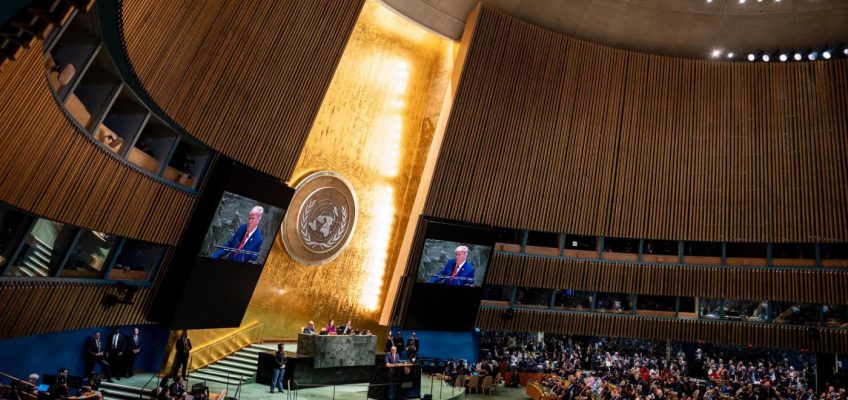By FARNOUSH AMIRI and ELLIOT SPAGAT, Associated Press
NEW YORK (AP) — The Trump administration pitched several other countries Thursday on its view that the global system for seeking asylum, in effect since World War II, has been rampantly abused and urged them to join the United States in cracking down on such migration.
Deputy Secretary of State Christopher Landau led the discussion on the sidelines of the U.N. General Assembly alongside representatives from Kosovo, Bangladesh, Liberia and Panama. Landau’s gathering allowed American officials to gauge early support and interest for what could be a massive revamp of the asylum system.
“If you have hundreds of thousands of fake asylum seekers, then what happens to the real asylum system?” Landau said in his opening remarks. “Saying the process is susceptible to abuse is not xenophobic; it is not being a mean or bad person.”
The U.S. said changes must, at a minimum, embrace asylum as a temporary status and dictate that those seeking protection should eventually return home. The Trump administration also emphasized that there is no right to receive asylum in a country of choice and that decisions are governed by individual nations, not multinational organizations.
Related Articles
Justice Department sues Minnesota, 5 other states in its quest for voter data
US sets stage for tariffs on robotics, medical devices
What to know about the opposition around renaming new Pell grants after Trump
Judge fails to appear for court hearing in Eswatini over 4 men deported by the US
Hegseth abruptly summons top military commanders to a meeting in Virginia next week
Human rights groups watched from the sidelines with unease.
Bill Frelick, Human Rights Watch’s director of refugee and migrant rights, said the U.S. proposal “looks like the first step in a bid to tear down the global refugee system.” He faulted the proposal for not embracing a core principle of the current system that people should not be sent to countries where they face persecution.
Filippo Grandi, the U.N. refugee chief, sat in the audience as the world leaders on the panel applauded the Trump administration’s controversial approach to asylum and migration. Grandi, whose organization advocates for those in forced displacement, used the Q&A portion of the event to plead with Landau to take advantage of organizations like his as the U.S. moves forward with this shift in nearly 80 years of policy.
“The right to seek asylum, which my organization upholds, is not incompatible with sovereignty,” Grandi said to the panel. He added that instead of rushing to halt the global asylum process, “the key is to address the root causes” that force people to flee in the first place.
The U.S. has been the top destination for asylum-seekers by far since 2017, with Germany a distant second, according to 2024 figures from the U.N. refugee agency. President Donald Trump and his allies say people with weak cases have abused the system to gain entry to the United States, obtaining work permits while their cases take years to wind through backlogged immigration courts.
The U.S. adheres to a global asylum system first laid out in the 1951 Refugee Convention and enshrined into U.S. law in 1980.
People seeking refuge in the U.S. are able to apply for asylum once they are on American soil, regardless of whether they came legally. To qualify, they have to show a fear of persecution in their own country because of specific reasons, such as their race, religion, nationality, membership in a particular social group or political opinion. Refugees meet a similar standard by applying abroad.
Once someone is granted asylum, they can’t be deported, they can work legally, bring immediate family, apply for legal residency and eventually seek U.S. citizenship. It offers a permanent future in the U.S.
The panelists Thursday, despite their countries facing varying degrees of migration, appeared to agree that economic migration, in which an individual flees to another country for better financial opportunities, has been conflated with individuals seeking asylum for safety purposes.
Vjosa Osmani Sadriu, the president of Kosovo, talked about her own refugee experience, saying that people like her who are experiencing real dangers and persecution are suffering from loopholes of the asylum system.
“We all came to the conclusion is that it is the illegal migration that must be challenged in order to protect and preserve the integrity of those who are real asylum seekers, of those who are legal citizens and those who respect the rules and respect the law,” she said.
The number of people coming to the U.S.-Mexico border seeking asylum has ballooned in recent years, overloading immigration courts and leading to cries that the system is being abused by people who are coming for jobs or other reasons that don’t meet the standards for asylum.
Facing mounting criticism over the large numbers of migrants coming to the border, the Biden administration took steps that severely curtailed asylum access.
The first day in office, Trump signed an order declaring an invasion at the southern border and said he was “suspending the physical entry” of migrants and their ability to seek asylum until he decides it is over. Immigration advocates have sued, and the issue is before the courts.
Spagat reported from San Diego. Associated Press writers Matthew Lee in New York and Rebecca Santana in Washington contributed to this report.




